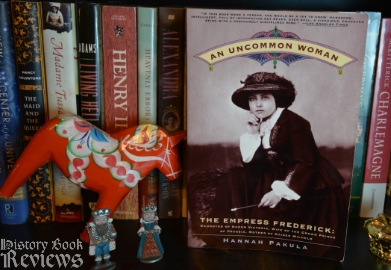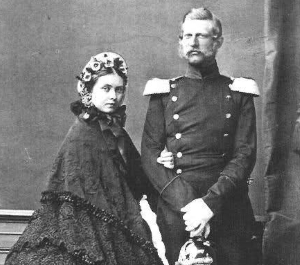An Uncommon Woman: The Empress Frederick, Daughter of Queen Victoria, Wife of the Crown Prince of Prussia, Mother of Kaiser Wilhelm
by Hannah Pakula

Review
What an unutterably tragic figure, what a horribly sad life. Reading about Vicky, eldest daughter of Queen Victoria, in An Uncommon Woman has left me with an imprint on my heart and soul and a dark desire to strangle Kaiser Wilhelm II until I see the life slowly ebb and fade from his stern eyes. Vicky, if not so much the book itself, has captured my fascination and my sorrow, and I want her life story to be known. An Uncommon Woman, while not my favorite style of biography, succeeds wonderfully in bringing justice and honor to a woman who was so terribly maligned throughout her life and beyond.
Vicky was an extraordinary person, from the day of her birth in 1840 to the day of her horrifically painful death in 1901. Demonstrating a remarkably keen intelligence from a young age, she became an unusually well-educated and philosophical woman for her era. Some would say: "No small wonder, for a daughter of Queen Victoria!" But actually the Queen was rather distressed by the cultural, religious, political, and philosophical beliefs Vicky espoused throughout her life, though she was proud of her daughter's extreme intellect. Vicky defied contemporary religious beliefs by believing in the theory of evolution and natural selection put forth by Charles Darwin, and she defied contemporary sensibilities when she chose to breast-feed her children herself (at least her younger children). For much of this she was heavily criticized, and 19th century Prussia was not kind to her.

Vicky with her beloved husband, Fritz, circa 1860.
This biography of Vicky, the Princess Royale of England, Crown Princess of Prussia, Empress Frederick, and eventually the Dowager Empress, is really extremely good. It draws very heavily on letters from Vicky and her mother, traded several times every week for their entire lives, so you hear their feelings and beliefs in their own words, making it a visceral reading experience. Hannah Pakula deals with Vicky's flaws and her strengths with a sympathetic neutrality, and I loved how much she let Vicky speak for herself throughout the book.
The great joy and the great suffering of Vicky's life was caused by the same event, her marriage to the Crown Prince of Prussia, known as Fritz, at the age of 17. Extremely rare for this day and age, especially in royal circles, Vicky and Fritz were deeply in love. They were best friends and soul mates for the duration of their 30 year marriage. But the entire court and people of Prussia hated Vicky for her Englishness, and ugly rumors about her spread that almost completely eclipsed the truth of her life and her character. Even her in-laws were horrible to her, refusing to even acknowledge her when two of her sons died young and then mocking her for her mourning. Her eldest children were poisoned against her by the politics of the realm, one of these being the future Kaiser Wilhelm II. This book, by the way, does not even scratch the surface of how crazy Wilhelm was (for that, read George, Nicholas and Wilhelm by Miranda Carter), though it does discuss his creepy erotic letters to his mother and his strange sexual obsession with her hands (I know that sounds bad, but trust me...it gets much weirder).
For me the book was disappointing though, because it was at times more of a political history than it was a biography of Vicky. The parts that dealt with Vicky's life and her humanity, her experiences and her feelings, her relationships with her children and husband, and her reactions to family events were fantastic. I started out flying through the book and being hungry to read more. But the book became more and more about the politics of Prussia, about Kaiser Wilhelm I and II, about Bismarck, about social unrest and military matters. I understand that this all formed the background for Vicky's life and her experiences, but in my eyes it was excessive and a bit boring when I wanted to learn about Vicky the person. For long stretches she was hardly even mentioned, except perhaps a line here and there from her letters showing what she thought about one political event or another. There was barely any content about her childhood and younger years before marrying Fritz. I didn' t find that the book delved deeply enough into her humanity and into all aspects of her life, though I do admit I have very high standards for that in history books/biographies. That being said, An Uncommon Woman was very well-written and very well-researched, and I did learn a lot from it.
Between her political slavery, her unkind and sometimes cruel in-laws, her fraught relationships with her children, and the devastating evils of cancer (as well as the truly terrifying medical treatments for it in the 1800's), Vicky's life was often far from happy. But her approach to life and to her sufferings was nothing less than noble, and it infuriates me that her reputation was blackened for generations due primarily to the cold-hearted lies told about her by her own son, Kaiser Wilhelm. Maybe she did have some failings as a mother, but seriously...maybe you can pin your deformed arm and some insecurities on your mother, but come on Wilhelm--inappropriate sexual fantasies and shameful smear campaigns won't make anybody feel better.
In the end, Vicky was forced to secretly smuggle all her letters out of Germany, because Wilhelm wanted them destroyed, wanted to keep Germany believing in the distorted image he created of his mother. From this enormous corpus of letters, mostly between Vicky and her mother, one of the most wonderful and tragic personalities of the 19th century has survived to tell her story in her own words, and this has been impressively captured by Hannah Pakula in An Uncommon Woman. Vicky deserves to be remembered for who she really was, and if only just for that I would highly recommend this book.



